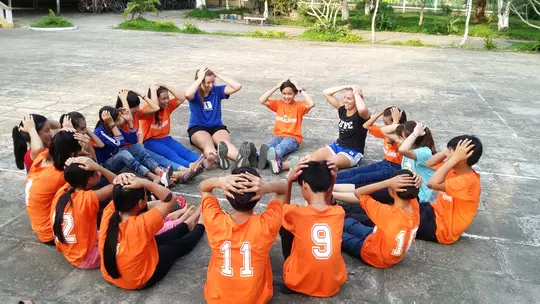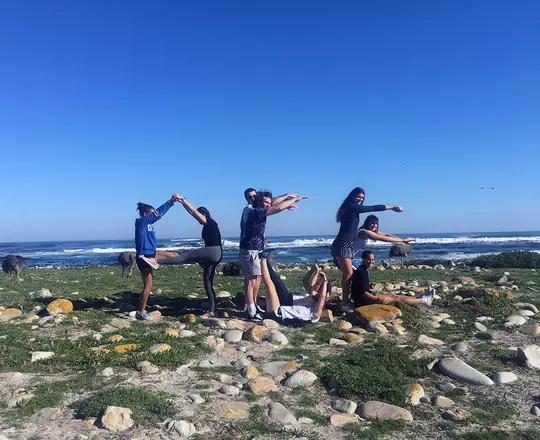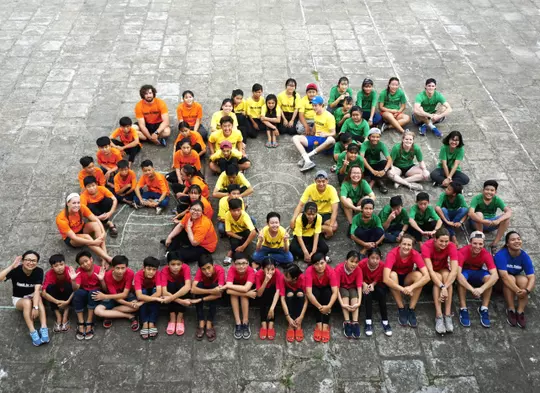
10 Years of ACE
The Rubenstein Student-Athlete Civic Engagement Program (ACE) was established in 2015 by Duke Athletics to provide Duke student-athletes with fully-funded international summer experiences focusing on service, leadership and global engagement. Now celebrating its tenth anniversary, ACE has supported over 315 student-athletes and continues to offer impactful programs worldwide.
This summer, 36 Duke student-athletes will work on environmental sustainability projects and sea turtle conservation in Costa Rica; coach an afterschool sports clinic in Panama; or contribute to education and food security initiatives in South Africa, all while maintaining their athletic training. ACE remains a one-of-a-kind experience in Division I athletics, setting the standard for high-impact global engagement programming.
To reflect on the program’s decade-long journey, founding ACE director Emily Durham and current program coordinator Sean Tate (Duke ’19 and ACE alum), teamed up to discuss ACE’s past, present and future.
The Beginning and The Vision
Emily: In 2015, thanks to the vision and generosity of David Rubenstein, we launched ACE to provide student-athletes with immersive service experiences that broaden their perspectives, build leadership skills and encourage meaningful global connections. There were so many things to figure out in the early days of ACE: how to design these experiences for student-athletes, balance cultural immersion with requirements like training and nutrition and find the ideal program length. The program has come a long way since that first year. When did you first hear about ACE as a student?

Sean: In 2016, at our swim team’s annual back-on-campus dinner. Our coach, Dan Colella, had us submit summer photos for a slideshow, and four of my teammates shared their ACE experiences in India, South Africa, China and Vietnam. After that, I knew I wanted to do ACE. I was especially drawn to the program because of the international aspect. I participated in the 2017 ACE in South Africa program, which remains one of my life's most impactful experiences.
Emily: And now you’re back, working with ACE for the last five years. What’s it like seeing the program from both sides?
Sean: As a student, your program experience is the final “product” of many months of planning and coordination with campus and partners worldwide. Now, I appreciate the work behind the scenes. Experiencing firsthand how transformative and impactful ACE is, it’s rewarding to help bring that same life-changing opportunity to more student-athletes.
The Student Experience and Evolution Over the Years
Emily: That dual perspective is why this conversation is perfect for our GoDuke readers. To me, what makes ACE special is how it continues to shape the student-athletes who participate long after the experience has ended, like you.
Sean: My experience with the ACE program has influenced so many different areas of my life I never expected. My time in South Africa gave me first-hand experience and knowledge in subject areas of interest that contributed to my cultural anthropology major. It expanded my identity beyond athletics, showing me there was much more I could do outside of my sport. As a student-athlete, I knew my options for international experiences were limited. ACE was my first international service experience and cemented my passion for my current career path. ACE provided the perfect balance: a chance to engage with a community abroad, while keeping up with training. It was short enough that I wasn’t out of training for too long, but long enough to form meaningful connections and make a real impact.
Emily: You participated in the ACE in South Africa 2017 program. What was that like? Any standout moments?
Sean: Being an ACE participant, in one word, was “awesome.” During our three weeks in South Africa, we supported a youth sports camp in a township called Nomzamo, near Cape Town. On weekends, we engaged in cultural immersion activities such as visiting Robben Island to learn about the history of apartheid, traveling to Cape Point and taking the cable car up Table Mountain. We had time to train at facilities nearby; I swam regularly at a local gym. I learned so much about myself, my ACE teammates and the community we worked with.
A standout moment for me came from my role coaching the rugby portion of the sports camp we supported. Going in, I was wholly unfamiliar with rugby as a sport. After the first day of the camp, I spent the night reading up and watching YouTube videos to learn the rules and positions. As we continued to coach the kids through drills, I could see their improvement. In the end, we held a full-on scrimmage and watched them play a full game of (touch) rugby. There was a shared sense of accomplishment among both the ACE students and the kids for getting the game together. It was so much fun seeing the joy on their faces as they played. That’s a memory that I’ll always remember.
Emily: ACE programs pack a lifetime of experiences into a few weeks. While South Africa has been our longest-running program, we’ve also adapted over the years, especially during covid, when we pivoted to virtual programs. What do you see as the biggest program transformations from your perspective as a program alum?

Sean: The impact and growth of the ACE Ambassador program. After your ACE experience, student-athletes return to campus and step into a leadership role through the Ambassador program. In sports terminology, they are our ACE “team captains.” Ambassadors play a central role in supporting our work, promoting the ACE program on campus and preparing future groups of ACE participants. As a former ACE Ambassador, it means a lot to mentor this younger group of ACE alumni.
The Long-Term Impact
Emily: As you shared, ACE’s impact extends well beyond the summer experience. It doesn’t just shape individual student-athletes; it also strengthens their teams. Coaches share that ACE participants return with improved leadership skills, a renewed passion for their sport and a deeper appreciation for the privilege of competing at the collegiate level. They bring back lessons in teamwork, adaptability and service that ripple through their teams. Our alums have gone on to do incredible things: two are Olympians, four have received Fulbright fellowships, many have achieved NCAA All-American status and countless others have pursued graduate studies, medical school and global careers. How has ACE impacted you and your teammates?
Sean: ACE influenced my career path and deepened my appreciation for global service. After graduating from Duke, I worked for an NGO in Mexico before returning as the ACE program coordinator. My teammates have also been deeply impacted. One teammate pursued a Fulbright in Taiwan after ACE in China. Another developed a passion for ethnobotany through the ACE in China program and is now pursuing a PhD.
Even small things, like a teammate who was a picky eater but embraced Vietnamese cuisine during ACE in Vietnam, show how these experiences shape us in unexpected ways. Duke Swimming & Diving has had one of the highest ACE participation rates, and I saw how it made our team more globally aware, collaborative and thoughtful, and contributed to a more cohesive team dynamic.
Emily: We always tell students ACE isn’t just a summer experience, it’s a “lifetime experience.” Many alums say it’s one of their most defining moments at Duke, part of the “Duke Difference,” shaping their values and perspectives, community involvement, career plans and friendships.
Looking Forward: The Next 10 Years
Sean: I hope ACE continues providing Duke student-athletes with incredible international experiences while expanding its reach, both in program locations and impact. Over the past decade, ACE participants have contributed more than 23,500 hours of service across five continents, and I’m excited to see how that number continues to grow over the next 10 years. I also hope that donors see the incredible impact ACE has on our student-athletes and contribute to its future, that alumni involvement continues to grow, and that service becomes even more embedded in the culture of our athletic teams.

Emily: Across Duke’s campus, ACE has become a model for successful athletics-campus partnerships, providing global experiences that are otherwise inaccessible for many student-athletes. As international education, collegiate athletics and higher education shift quickly, ACE’s long-term success depends on building a financially sustainable model that can adapt to what lies ahead. Over the next decade, I want ACE’s reach to expand across all our 27 varsity teams by designing innovative programs that become a flagship model for student-athlete leadership and development. I hope ACE will engage 400-plus additional student-athletes and build a robust alumni engagement program that empowers students to translate their ACE experiences into meaningful careers and advanced study. And finally, I believe participation in ACE programs will help Duke teams achieve even greater success on the field, court, pool and beyond with the skills and experiences student-athletes bring back to their teams.
Final Reflections
Sean: As a college athlete, it’s easy to hyper-fixate on your sport. But you won’t play your sport forever. ACE pushes you outside your comfort zone, broadens your perspective and helps you grow beyond athletics. It’s a unique Duke opportunity that develops well-rounded individuals, preparing them for life beyond their four years while still aligning with their athletic goals. To me, ACE is about connection, growth and perspective.
Emily: Directing ACE has been challenging yet deeply rewarding. At its core, ACE is about the student-athletes and the profound relationships they make with each other and communities worldwide. Moments that stand out to me include last summer’s final volleyball game in Panama, where our student-athletes and the kids from the two elementary schools we partnered with came together with their families for a friendly match and a heartfelt “despedida,” or farewell celebration. The game started with enthusiastic team cheers and ended with our student-athletes sweaty and hoarse from cheering so loudly for their kids on the outdoor volleyball court. They would have given any Cameron Crazie a run for their money with their energy and excitement.
Sport has the power to build connections and strengthen communities, and that’s what I believe ACE is all about.
For more information, visit www.ace.duke.edu to learn more about the ACE programs and read reflections from past participants. ACE Summer 2025 kicks off in May. Follow along on the ACE Instagram account @ACEathletes.
